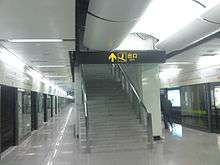Guanglan Road Station
 Platform at the underground station | |||||||||||
| Location |
Shanghai China | ||||||||||
| Operated by | Shanghai No.2 Metro Operation Co. Ltd. | ||||||||||
| Line(s) | Line 2 | ||||||||||
| History | |||||||||||
| Opened | February 24, 2010 | ||||||||||
| Services | |||||||||||
| |||||||||||
Guanglan Road Station (simplified Chinese: 广兰路站; traditional Chinese: 廣蘭路站; pinyin: Guǎnglán Lù Zhàn) is a station on Line 2 of the Shanghai Metro. The station is located along Zuchongzhi Road and is located between the Tangzhen station and the Jinke Road station on Line 2. The station is located at an intersection of Zuchongzhi Road and Guanglan Road, and has four exits. The station was opened on February 24, 2010, after Line 2 was extended from the Zhangjiang Hi-Tech Park station.
The station has three tracks, an island platform, and a side platform. All service is on the island platform as of May 2013.
History
By 2008, the Line 2 terminated at the Zhangjiang Hi-Tech Park station.[1] On February 24, 2010, the line was expanded from this station through the Jinke Road station to the Guanglan Road station.[2][3] Two months later, the line was extended past the station through the Tangzhen, Middle Chuangxin Road, East Huaxia Road, Chuansha, Lingkong Road, Yuandong Avenue, and Haitiansan Road stations to the Pudong Airport station, which serves the Shanghai Pudong International Airport.[4][5]
Facilities
The station is located in Shanghai's Pudong New Area, along Zuchongzhi Road near an intersection with Guanglan Road and Shenjiang Road.[6]
Exits
Shaped like an oblong rectangle, the station has 4 exits.
- Exits 1 and 5 are located north of Zuchongzhi Road, with exit 1 further to the east than exit 5.
- Exits 2 and 4 are located south of the road, with exit 4 further to the west than exit 2.[7] Exit 4 is located south of the Pudongxingqu Zhangjiangzhen Zhongxin Elementary School, which occupies the area above the western section of the station. The eastern section of the station is located beneath a Shanghai Tianxiang Garment Manufacturing Ltd. Co. building. The station is served by bus routes 615, 636, and 990.[6]

Service
Along Line 2, the station is located between the Jinke Road station and the Tangzhen station.[8] It takes approximately 60 minutes to ride the train to the East Xujing station, the west end of the line, and 34 minutes to the Pudong Airport station, the eastern terminus. The train operates from 5:30 to 22:45 westbound and from 6:30 to 21:00 eastbound.[9] On weekdays, trains leave the station approximately every 3 minutes and 30 seconds during peak hours and every four to ten minutes during non-peak hours. Peak hours are defined as from 7:30 to 9:30 and 17:00 to 19:00 on Monday through Thursday, as well as 7:00 to 9:00 and 12:50 to 20:30 on Friday. On weekends, trains leave the stations every 4 minutes and 5 seconds from 8:00 to 20:30, and every five to ten minutes during other times.[10] The station is a transfer station for passengers traveling to or from points east on Line 2. From Guanglan Road to the east, Line 2 uses 4-carriage trains; to the west Line 2 uses 8-carriage trains.[2]
References
- ↑ Shanghai Metro (Map). Schwandl, Robert. 2008.
- 1 2 Li, Xin (February 22, 2010). "Rail Transit Line 2 to extend from Zhangjiang Hi-Tech Park to Guanglan Road". Retrieved April 8, 2011.
- ↑ Wang, Guanyu (February 2, 2010). "Line 2 to extend to Guanglan Road". Retrieved April 8, 2011.
- ↑ Huang, Qiongnuo (April 6, 2010). "Rail Line 2 Extension East to Connect Pudong International Airport". Retrieved April 8, 2011.
- ↑ Zhou, Jian (April 7, 2010). "Line 2 to Pudong International Airport". Retrieved April 8, 2011.
- 1 2 Google (April 8, 2011). "Guanglan Road Shanghai Metro Station" (Map). Google Maps. Google. Retrieved April 8, 2011.
- ↑ Map of Guanglan Road Station (Map). Shanghai Shentong Metro Group. December 2009. Retrieved April 8, 2011.
- ↑ Map of the Shanghai Metro (Map). Shanghai Shentong Metro Group. Retrieved April 8, 2011.
- ↑ Shanghai Shentong Metro Group. "Timetable of the First and Last Train for Line 2". Retrieved April 8, 2011.
- ↑ "Shanghai Subway Line 2". March 29, 2010. Retrieved April 24, 2011.
| Wikimedia Commons has media related to Guanglan Road Station. |
Coordinates: 31°12′47″N 121°37′08″E / 31.2131°N 121.619°E